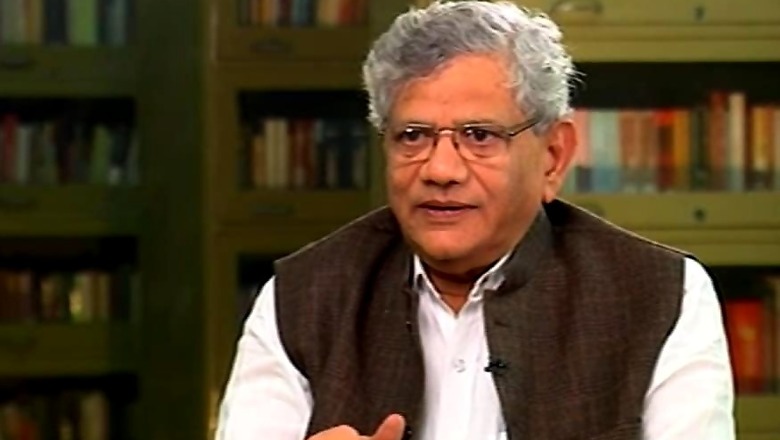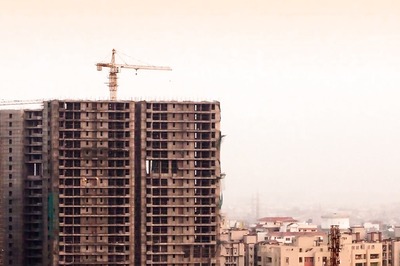
views
In an exlusive interview to CNN-News18's Rupashree Nanda, CPI(M) General Secretay Sitaram Yechury lamented that the Gujarat model is being being implemented throughout the country. Yechury said, in northern Kerala, where there is a sizeable Muslim population, the BJP and the RSS are resorting to violence in order to weaken the Left so that they can achieve their objectives. They want to be a threat everywhere through their use of politics of violence and terror, said Yechury. Here is the complete interview.
Q: Sir, you have emerged as one of the strongest critics of PM Modi when it comes to demonetisation. Do you feel this has an echo amongst the people?
Sitaram Yechury: I think so. Definitely this has an echo and we can see that resonating among the people. All that demonetisation has achieved for the bulk of the Indian people is greater misery. I mean, you have huge losses, as a result, you have a virtual elimination of what was called the informal sector of our economy, which contributes more than half to our GDP and nearly 80% of your non-agricultural employment. With that being shattered, lives of crores of people have been completely crippled. So the effect of demonetisation, finally, has been that more money has come back. That is my estimate, because if you add the money that is yet to come back from countries like Nepal, Bhutan, Dubai, Singapore, then it'll be more than what was actually demonetised. So what does this mean? This means that the black money has been legalised as white and has come into the banking system. Mr Raghuram Rajan says that the banks are now paying an additional interest of Rs 20,000 crore annually because this money has now come into the banking system. You've legitimised the black money and you have actually legitimised even counterfeit currency. I mean that is the meaning of all the extra money coming back.
Q: Why is it not reflecting politically on the BJP's fortune? How is it that Mr Modi still remains very popular?
Sitaram Yechury: No. The point here is that peoples' discontent is being channelised into communal polarisation, and if you look at the election results post demonetisation …by then the effect of demonetisation had not been felt so much by the time the UP elections took place. But in UP elections also it was very, very rabid communal polarisation that took place. It was a very scientific caste-based social engineering that was done targeting specific groups and that is the reason why they have won, not because people are happy with demonetisation. Not at all.
Q: When you look at PM Modi how would you rank him on his performance, even though he has a couple of more years to go, amongst all the prime ministers that India has seen so far?
Sitaram Yechury: In my political experience from the time I came into politics, from Indira Gandhi as a prime minister till today, I've seen various prime ministers. But what I can say today is that I have never seen such an assault on the entire secular democratic foundations of our constitution. We've seen Indira Gandhi's Emergency, I've been victim of that. But the assault that we are seeing now is a multi-dimensional thing: on parliamentary institutions on educational institutions on the rabid communal polarisations, interference in the institutions of our democracy. You see the RBI, you see the other institutions like the cultural bodies. This sort of an all-round attack has not been seen earlier.
Q: How would you rank him as a Prime Minister?
Sitaram Yechury: Well, isn't it obvious? If this is the sort of an attack I would say that today in order to safeguard the fundamental constitutional values of a secular democratic republic, it is important to see that this sort of a government and these sort of policies cannot continue.
Q: What is your strategy for 2019? You have given a call for all non-BJP leaders to unite and take on the BJP and the Prime Minister, but what is your strategy? Look at Nitish Kumar. Then you have Mamata Banerjee. How do you even say that anybody looking at this would have confidence?
Sitaram Yechury: What 2019 requires is alternative policies and that is why, in Hindi you say, Desh ko neta nahi niti chahiye (country doesn't need a politician but policies). Now alternative policies and, such policies we believe exist, and there is no shortage of funds in India for an alternative economic policy direction rather than this neo-liberal economic reforms. And therefore on the basis of such policies we'll try to mobilise all other left and democratic forces. That would be our strategy. My call to the non-BJP chief ministers was essentially on the attacks that we are seeing on Centre-State relations today. Now with the GST, the manner in which it is being implemented, the states' financial authority is completely eliminated. They have to come to the Centre with a begging bowl in case a national disaster strikes. So, in this situation we said all the non-BJP chief ministers should come together. But politically for 2019 it all depends on the alternative policy... policy alternative.
Q: Is this invitation also for Bengal CM Mamata Banerjee?
Sitaram Yechury: Well, Mamata Banerjee... today the Trinamool Congress government is acting as the B team of the BJP. The reason is that there is a competitive communalism on communal polarisation that is taking place in the state which, I think, is disastrous. Not only for Bengal but for India. Remember, I know people forget, but when India became independent, 15th of August 1947, Mahatma Gandhi was on an indefinite hunger strike in Calcutta to stop the communal mayhem that was taking place during the time of partition. Noakhali communal riots- one of the worst to have ever happened in our History. Bengal has that history. We have been able to subdue that and create an atmosphere where communal harmony during the Left government rule. Now, that is entirely breaking up. With this competitive communalism - which will squeeze out space for any democratic movement, not only Left, so in this situation it is very dangerous… to have that sort of a competitive communalism continue in Bengal. So, given that, I don't think it's possible to have anything to do with the TMC. Unless it stops this sort of politics. Stop the politics of violence and terror that continues in Bengal.
Q: What are your own plans of reviving Left in West Bengal? You allied with the congress party you suffered terribly. Cadres are demoralised?
Sitaram Yechury: That is not true... just now we had a huge padyatra in Bengal... starting from many corners and converging in Calcutta. The point is that will they be allowed to vote? That is where the crucial thing comes. If you are measuring anything in terms of electoral results, then what is crucial is will there be a free and fair poll.
Q: Do you think that the Left is suffering in West Bengal because there are no free and fair polls, as you have termed it?
Sitaram Yechury: Yes. Electorally, I would say.
Q: Would it not be an exaggeration?
Sitaram Yechury: Even the Election Commission is on record saying that their remit is to a certain limit... along the polling booth or they can only ask the forces to take some action in the areas. Now, if terror is instilled in the villagers themselves, preventing people from coming out of the village to the polling booth, nobody can do anything. That is what we are fighting. We lost 176 of our comrades during these fights so it's not an exaggeration. Definitely, the Left has weakened in Bengal, there is no doubt about it. We have introspected... we have understood from the mistakes we have done and we have corrected them.
Q: Politically, what was your biggest mistake?
Sitaram Yechury: Politically, the mistake was in the manner of industrialisation that was envisaged.
Q: The Vishakhapatnam party congress that elected you as a general secretary has called for equidistance from the BJP and the Congress. What has changed to force a rethink within the CPM now?
Sitaram Yechury: First of all, at Vishakhapatnam Congress, we identified the BJP as our main enemy, but in order to fight that main enemy we said we shall have no electoral understanding or an alliance with the Congress; probably, because the Congress is the progenitor of all these economic policies. And because of the Congress' misrule the BJP gained. Apart from the BJP's communal polarisation etc... so given that fact we say that without any electoral understanding or alliance with the congress this is what we decided. Now the fact that BJP is our main enemy continues and now in these three years of experience this is becoming even more starker. So, therefore, our next party congress will be in Hyderabad, in April, next year. They will take stock of the situation and see how to proceed forward.
Q: But what is the reason you went ahead with the congress in West Bengal?
Sitaram Yechury: West Bengal at that point in time as I told you it's a very extraordinary situation. And the situation was to fight the terror. That was unleashed and which continues even today in many parts. The victims of the terror were both Congress and the Left and many places... initially it happened in many places and we were not in a position to field a candidate because of this terror and, therefore, we had said that we will contest only certain amount of seats. And for the rest of the seats, we will support a candidate who will defeat TMC and the BJP. That's how it began, but as the campaign from below started... it turned out be virtually, sort of a joint campaign in many parts, many constituencies. That was not the idea. That is why central committee criticised West Bengal, saying that they went beyond the brief. The process of how to correct has been initiated.
Q: You have a kabhi haan Kabhi na relationship with the Congress. Now looking at 2019 what will be your relationship with the Congress.
Sitaram Yechury: Again, as I said the whole strategy will depend on the set of alternative policies. That depends on which party agrees and which doesn't.
Q: So you're open to coming together?
Sitaram Yechury: No. I mean, it's not a question of open, it's not merely electoral.
Q: Jairam Ramesh has said that Congress is facing an existential crisis. That it has to renew, reinvent itself in order to even survive. Do you think that is more true of the Left also? And if the Congress party is in such a bad shape, why is the left even keen to appear to be even willing to talk to the Congress?
Sitaram Yechury: No, we never said that. We are fighting the Congress tooth and nail in Kerala. We'll be fighting them tooth and nail in Tripura. So wherever we are they are there. The fight is with the Congress because they are the main opponents. So, there is no question of keeping any doors open with them. The question right now is on issues concerning the people. Suppose in a situation of communal riots, all the forces who are opposed to it and want peace restored, we'll go with all of them.
Q: Does the Left also perceive that it has a need to reinvent itself?
Sitaram Yechury: Well, Left is always a dynamic process. It has to be. Because the essence of Marxism - the ideology we believe in is a concrete analysis of concrete condition. As conditions keep changing our analysis has to change. Otherwise, I personally think that if it doesn't change, then you are not a Marxist. So as a Marxist party we continuously have to update our analysis in accordance with the conditions. So we are in the process of a constant reinvention.
Q: The Left party, specially your party, is perceived to be extremely rigid and a more recent example of that was how it denied you an opportunity in the Rajya Sabha. So are you disappointed that the party did not send you to the Rajya Sabha?
Sitaram Yechury: No.
Q: Don't you think it was another demonstration of its rigidity? Not unhappy at all?
Sitaram Yechury: No. I am not at all unhappy. In fact, as early as April, I had said that I will not be contesting again. That's because we have a norm in the party that does not allow more than two terms. In addition to that my getting re-elected would mean obviously it would have only been possible with the support of the Congress party. And that is an election to the Rajya Sabha and that would mean an electoral understanding. That was something that was ruled out. And lastly, as a general secretary, I am preparing for the party Congress.
Q: You don’t have any regrets?
Sitaram Yechury: None at all!
Q: You are happy that your party didn’t elect you?
Sitaram Yechury: I was initially very unhappy when they sent me there. Only when Somnath Chatterjee became the speaker then the Politburo thought that you required a voice in the Parliament. So, therefore, I was asked to go. It all happened very suddenly, I was completely unprepared for it when I entered and completely prepared when I left.
Q: Congress vice president Rahul Gandhi is all set to take over as president of the Congress party. How would you see that, how would you rate his skills vis-a-vis current Congress president Sonia Gandhi?
Sitaram Yechury: These are all internal matters of the Congress. So, that is their decision - whatever they decide. I mean there is a lot of speculation in the media. But when that'll happen it will be the Congress party's decision. But, I think Mrs Gandhi, Sonia Gandhi, played a very crucial role in the formation of the UPA and in the entire effort to get rid of the NDA government of Mr Vajpayee which was then necessary for the country. So she has played that role and she continues to be the glue, both, in keeping the party together, and also many secular allies together. So she played her role. We are very very critical of the policies that they followed when they were in government and we think those were anti-people and they were wrong. If the new president of the congress party comes in, all that we can do is wish him all the success, our good wishes are with them.
Q: In your experience, do you think he can play the role his mother has played? Do you think he has demonstrated those skills: the aptitude, the energy, the tenacity that has been demonstrated by his mother?
Sitaram Yechury: Well, he has been showing that around the campaigns - I mean, his recent campaign in Gujarat, he showed that he is capable of both the (tenacity) as well as getting well with the people at the grassroots and things like that. So I mean, just remember, anybody entering into a position of responsibility for the first time naturally cannot be compared to somebody who is leaving that position after a long time. That would be unfair, not only in this case, but in any other case.
Q: Is he a natural politician or a reluctant politician: Mr Rahul Gandhi?
Sitaram Yechury: Well, I think all of them begin reluctantly, but then with the responsibility they grow up.
Q: So you think he is not a natural politician?
Sitaram Yechury: Well, I won't say unnatural politician, that’s not the case... but I will say that his commitment will only be demonstrated when he is in a position of responsibility.
Q: Coming back to Kerala, there's a lot of political violence in Kerala. Your party and the BJP have accused each other of the killings. What do you think is the solution there?
Sitaram Yechury: First of all, accusations apart, allegations apart, there are facts. These are facts for the last forty years or so. In northern Kerala, where there is a sizeable Muslim population, the BJP, the RSS have been viewing it as a fertile ground for them to grow. Now, that has not been happening because of the strong Left presence. So they have been resorting to violence in order to weaken the Left so that they can achieve their objective. These sort of violent periods have been going on periodically. But, this time the round of violence that started began on the day of the assembly election results, when the BJP hurled the bombs killing our comrades and these attacks continue. It's literally the chor calling the kotwal (thief calling out the police). But the solution - you asked for the solution. Earlier also what was the solution? The solution is for a political settlement, you'll have to have discussions between both the warring parties. We have invited them at the level of the state government and the chief minister, at the level of the party and the general secretary but nothing is emerging out of that. We are prepared for talks. We asked them to come for talks, we want to put an end to this violence. Even though Mr Amit Shah was there the violence continued.
Q: BJP and RSS have also lost their men. It's on both sides.
Sitaram Yechury: No it's not... I mean we lost more… that is also a fact. But it's not a good sign at all. We don't want this violence. But then somebody has to respond to stop it.
Q: Your statement that 'we are capable of giving a fitting reply' almost seems like an eye for an eye answer, so is that a responsible answer?
Sitaram Yechury: Otherwise what do I say? Kill more of my comrades? If you're at the receiving end how do you protect your own people?
Q: But killing is not protection.
Sitaram Yechury: That is why I say... once the spree of violence begins please understand it's a natural thing... I mean there are two soldiers on a battle field. If one is killed by the enemy's bullet the other one is not, you can't speak rationally to him at that time. His reaction would be the most violent one.
Q: Do you perceive BJP to be a threat in Kerela?
Sitaram Yechury: Well, they want to be a threat everywhere through their use of politics of violence and terror or, they have a variety a combination effect- either through threats and intimidation or straight forward bribery or through the creation of violence of this sort. What the BJP has mastered in these three years is to form governments even after losing elections. Misusing the CBI. Not a single corruption case where the BJP is involved is being investigated. With every other opposition leader you'll find something being done. Now what is all this? There is no legitimate political discussion.
Q: Sir, you used the term post truth to describe or understand Mr Modi's hold over the masses. What is your response to that?
Sitaram Yechury: Post truth is to portray as truth. The leader and his exhortations are completely unrelated with the actual ground realities. We have to bring the ground realities back to the centrestage of political discourse. And that is what we are trying to do through these people's movements.
Q: Discontent is there. I had gone to Nagpur in Maharashtra there was discontent about demonetisation, but they (BJP) won the local elections.
Opposition is not being seen as an alternative.
Sitaram Yechury: Precisely, because of the post truth we are talking about what we discussed earlier of diverting that discontent into communal polarisation or caste based social engineering. For example, these three days when you had nearly a lakh of working class people protesting every day in front of the parliament, tell me where was it shown?
Q: Parliament sessions being curtailed or deferred or delayed perhaps due to Gujarat elections. How do you see that?
Sitaram Yechury: Very, very, very anti-democratic. I think the Gujarat model is being implemented now in India. In Gujarat, in the calendar year, if you look at it - I don't think the assembly sits for more than a month. We as a party have been spearheading the move asking or a constitutional amendment saying that the India parliament must meet at least 100 days in one calendar year. The record has been dismal, and has been declining rapidly since this government came. A curtailed parliament (session) is a very very dangerous move. That's why initially I had said this is all round attack on the constitutional order. This curtailing of the winter session is only for the sake of your Gujarat elections. And you didn't want any debate on the series of corruption charges their own leaders are facing amid the economic mess that has happened because of demonetisation and GST. In order to stop these debates coming on to the national discourse, people' discourse, you stopped the Parliament. Most anti-democratic completely condemnable.
Q: Sir, Thank you so much for joining us.
Sitaram Yechury: Thank you so much.



















Comments
0 comment